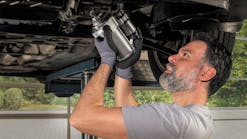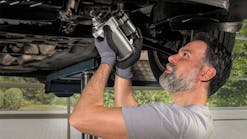For most of the piston engine’s history, the way to make more power was to increase its displacement; but not anymore. Daimler has announced plans to replace most of their existing engines with small V8s, straight 6s and even 4-cylinder engines. The Dodge Charger, promoted as a new-era muscle car, comes with a V6 engine as ‘standard’ equipment, and the new Chevy Malibu makes do with a 2.4L four.
Smaller engines are possible because now they make a lot of power-per-displacement, a.k.a. power density. The new 4.0L Mercedes V8 can make over 400 horsepower, and the Dodge V6 makes almost 300. Compared to previous engines, these are amazing numbers. The venerable 2.5L Iron Duke in a 1991 mid-size Chevy made 110 hp, while the engine in today’s mid-size Malibu engine makes 65 percent more power with less displacement.
Smaller engines are lighter and take up less space, and a whole new class of small cars has been designed around this new-found power density. The Smart car’s 1L 3-cylinder engine makes 70 hp. The GM Spark will come to the U.S. later this year with the ‘big’ 1.2L 4-cylinder engine making 85 hp. Ford plans to launch a 1L 3-cylinder engine next year that produces the same power as today’s 1.6L four.
The increase in power density comes mostly from fuel injection technology. Called gasoline direct injection (GDI), this system injects the fuel directly into the engine’s combustion chambers. It requires higher injection pressure, which improves air/fuel mixing. It also allows a higher compression ratio, which greatly improves power and engine efficiency.
Although GDI fuel pumps are mechanically driven by the engine, most of the sensors and electronic controls are the same as on a standard fuel injection system.
Gasoline Direct Injection has been in use for almost twenty years now, but only in limited applications. It took off in Europe about six years ago, and over the last two or three years it’s been adopted by almost every other manufacturer in the world. This affects your business because every new generation of engine technology spawns a need for new and different tools.
Cars with these new engines and GDI systems are just beginning to show up in aftermarket repair shops in large numbers. New diagnostic equipment and service tools will be needed to work on them. There’s not a lot out there yet, but keep an eye open for tools specifically intended for working on GDI systems. We’ll let you know as soon as they’re ready.



